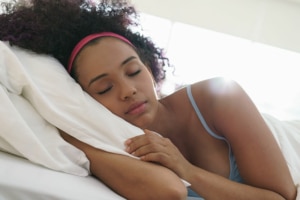Improve your sleep and improve your life!
 By Sharon Trongaard, RRT, MS, MPH, Clinic Director/Risk & Compliance Officer and Respiratory Therapist at Health Partnership Clinic
By Sharon Trongaard, RRT, MS, MPH, Clinic Director/Risk & Compliance Officer and Respiratory Therapist at Health Partnership Clinic
Sleep is vital to our good health. Studies now link a lack of sleep to increasing the risk for obesity, diabetes, heart disease and dementia. Over time, a lack of sleep is even associated with a shortened lifespan. So even though it may be tempting to give up a few hours of sleep to get stuff done, in the long run prioritizing your sleep will improve your health and ability to enjoy life.
Getting enough sleep is as important to your health as a good diet and exercise.
Getting good sleep can become more difficult as we get older (Abbasi, 2012). Sleep is of course important for our brains, allowing us to be focused and alert, but it is during deep sleep that your brain also “takes out the trash” of byproducts and toxins that build up. A recent study by the National Institutes of Health found that impaired glymphatic clearance (the brains waste removal system), which occurs primarily during sleep, contributes to the development of Alzheimer’s Disease (Reddy, OC, 2020).
As a Respiratory Therapist and Sleep Educator, I know that everyone experiences trouble sleeping occasionally. But if you routinely have trouble falling asleep or staying asleep more than one night a week, you should consider a few small changes recommended by the Harvard School of Sleep Medicine that could improve the quality of your sleep (Harvard, 2019).
- Avoid caffeine, alcohol, tobacco, chocolate, soda and some pain relievers four to six hours before bed. These substances can make falling asleep and staying asleep more difficult.
- Make your bedroom a welcoming space for sleep by creating an environment that is:
- Comfortable – Your bed should be supportive with a good mattress and inviting with cozy pillows, sheets and blankets.
- Dark – Keep out light from windows with black out curtain and make sure that clocks and other electronics in the room have the display turned off or set very dim. Even small amounts of light can disturb sleep.
- Well ventilated – Generally people sleep longer in cooler environments with temperatures between 65-85°F.
- Quiet – if you have a pet that wakes at night, you may consider having them sleep outside your bedroom. If your partner snores or there are other noises, consider using earplugs or a white noise machine.
- Use light to your advantage.
- If you have problems waking in the morning, get some sunlight as soon as possible. Open the blinds as soon as you get up to let some light in. Each day try to get at least 20 minutes in the sunlight. Exposure to the sun helps regulate your circadian rhythm by turning melatonin production off when it is light and turning it on when it is dark to help you fall asleep.
- Limit exposure to blue light from computers, tablets and phones, especially two hours before bed. Blue light can turn off melatonin production.
- Have a bedtime routine. Remember when you were little and your parents would give you a bath, read you a book and tuck you in? These routines let your body know that it is time for sleep. Create your own routine by reading, meditating, or listening to music. Avoid activities that are stressful or energizing as these can increase the production of cortisol (the fight or flight hormone) that can keep you awake.
- Keep a consistent sleep schedule. Sleeping in on the weekends may seem like a great idea, but it can lead to trouble falling asleep the next night. On the weekends wake up at your normal time and use the extra times for some selfcare. Go for a walk, watch the sunrise, read the paper, or cook a healthy breakfast!
 Implementing one or several of these changes in your life may help improve how easily you fall asleep and your ability to stay asleep. If you have frequent problems sleeping, snore or experience excessive daytime sleepiness, you should visit your provider who can look for sleep disorders such as sleep apnea or insomnia. At Health Partnership Clinic, our providers know that sleep is key in our approach to whole person health, and we encourage our patients to talk about any sleep issues so we can partner with them to find solutions.
Implementing one or several of these changes in your life may help improve how easily you fall asleep and your ability to stay asleep. If you have frequent problems sleeping, snore or experience excessive daytime sleepiness, you should visit your provider who can look for sleep disorders such as sleep apnea or insomnia. At Health Partnership Clinic, our providers know that sleep is key in our approach to whole person health, and we encourage our patients to talk about any sleep issues so we can partner with them to find solutions.
References:
Abbasi B, Kimiagar M, Sadeghniiat K, Shirazi MM, Hedayati M, Rashidkhani B. The effect of magnesium supplementation on primary insomnia in elderly: A double-blind placebo-controlled clinical trial. J Res Med Sci. 2012;17(12):1161-1169.
Harvard Medical School. Improving Sleep: A guide to a good night’s rest. 2019. Accessed June 23, 2021. https://www.health.harvard.edu/staying-healthy/improving-sleep-a-guide-to-a-good-nights-rest#table-of-contents
Reddy OC, van der Werf YD. The Sleeping Brain: Harnessing the Power of the Glymphatic System through Lifestyle Choices. Brain Sci. 2020;10(11):868. Published 2020 Nov 17. doi:10.3390/brainsci10110868






